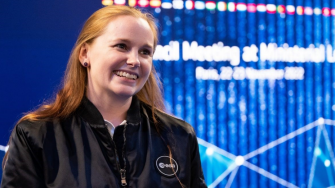From UNSW O-Week to Zero-G for future astronaut Dr Meganne Christian
Dr Christian learnt a range of skills during her studies at UNSW which gave her the foundation to enjoy an interesting and varied career that might ultimately take her into space.
Dr Christian learnt a range of skills during her studies at UNSW which gave her the foundation to enjoy an interesting and varied career that might ultimately take her into space.

In 2005, Dr Meganne Christian commenced her first year as an undergraduate at UNSW Engineering. Less than 20 years later she had been selected as a member of the European Space Agency astronaut reserve and working as an exploration commercialisation lead for the UK Space Agency.
Dr Christian learnt a range of skills during her studies at UNSW which gave her the foundation to enjoy an interesting and varied career that might ultimately take her into space.
As a Co-op Scholar, she received a final grade of Honours Class 1 and the University Medal for her Bachelor of Engineering degree, before completing a PhD for research into hydrogen storage which also earned her the Dean's Award for Excellence in Postgraduate Research for her doctoral studies, the UNSW Research Excellence Award and the National Postgraduate Student Energy Award from the Australian Institute of Energy.
“I think being at UNSW definitely shaped me. One of the things I remember is that I really took every opportunity that came up. I was involved with the Yellow Shirts and became an O-Week coordinator.
“I do still have that on my CV and I think it was relevant for astronaut selection because they are looking for people with teamwork and leadership qualities. It also helped teach me how to organise my time and to instil discipline.”
“I was determined to make the most out of everything at UNSW and I think it made me a well-rounded sort of person.”
Following the completion of her PhD in 2014, Dr Christian – who was originally born in UK before moving to Australia as a child – relocated back to Europe to conduct research on graphene with the National Research Council of Italy.
In that role, she got a first small taste of what life might be like as an astronaut while carrying out experiments in zero gravity conditions during a parabolic flight.
The experience, onboard a specially designed Airbus A310 which continually climbs and then goes into ‘free fall’, offers the feeling of weightlessness for around 22 seconds each manoeuvre.
The plane repeats the procedure more than 30 times to allow researchers to conduct their experiments, for a total of 10 minutes in space-like zero-G conditions.
“Weightlessness is amazing,” says Dr Christian. “You can get a very small sense of it when you go on a roller-coaster and there is a big drop, but on a parabolic flight it goes way beyond that and is just incredible.
“That first time I did it I enjoyed it a lot, but I then did it again a few years later and I was incredibly sick and it was not a fun experience.
“At that time I was just thinking about applying for the ESA astronaut program and I asked the doctor onboard whether he thought it was a big problem. But the thing that makes you feel sick in parabolic flight is completely different to what might make you suffer from space-sickness, so that was reassuring to know.”
Dr Christian subsequently enjoyed another adventurous role, taking on an eight-month placement at the Concordia Station in Antarctica conducting atmospheric physics and meteorology research.
She was part of a team of 13 who were completely isolated, just 1000 miles away from the geographic South Pole, regularly enduring temperatures of minus 65 degrees Celsius, with extreme lows of minus 80!
“Going to Antarctica meant doing something completely different – natural sciences rather than applied sciences,” she says.
“I had to run the observatories, be a technician and troubleshoot and problem-solve. And on the people-skills side of it you need to be able to get along with a small group of people in isolation for a long period of time.
“Being in Antarctica crystallised the idea I had about applying for the ESA astronaut program. I was running other people’s experiments, doing some important research and really enjoyed it. I realised what was being done in Antarctica was quite similar to what is happening on the International Space Station.”
Dr Christian was one of 22,500 people who applied to join the 2022 ESA astronaut class – and she was one of the lucky few to be selected. As a member of the European astronaut reserve she has received basic training is on constant stand-by in case a flight opportunity to go into space is identified.
“There are a lot of amazing space projects coming up and I am looking forward to being a part of it. It’s even possible we could have a collaboration between UK and Australia and ESA to potentially have an Australian flag fly to the International Space Station, which is a really exciting prospect.”
As Australia’s best engineering faculty turns 75, there are just as many reasons why we’ve earned that title. Discover new stories weekly, celebrating the successes that have enabled progress for all.